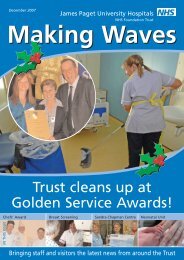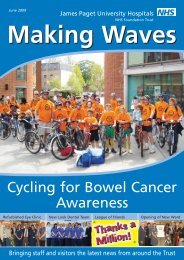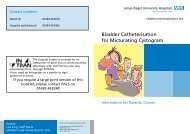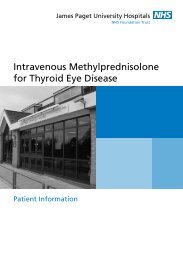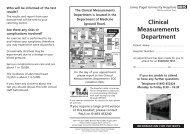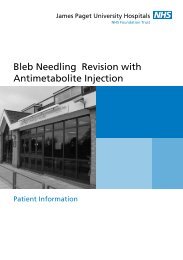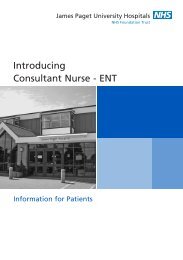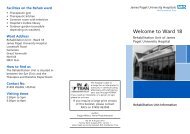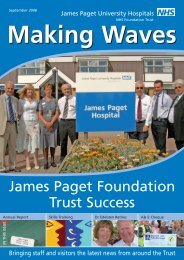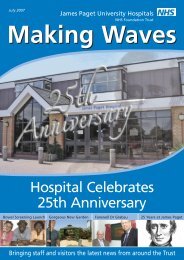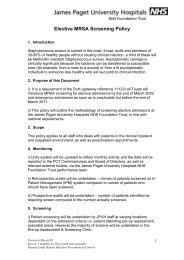Bartholins llt - James Paget University Hospitals
Bartholins llt - James Paget University Hospitals
Bartholins llt - James Paget University Hospitals
You also want an ePaper? Increase the reach of your titles
YUMPU automatically turns print PDFs into web optimized ePapers that Google loves.
<strong>James</strong> <strong>Paget</strong> <strong>University</strong> <strong>Hospitals</strong><br />
NHS Foundation Trust<br />
Women & Child Health Division<br />
Drainage or Marsupialisation<br />
of a <strong>Bartholins</strong> Cyst or Abscess<br />
Gynaecology Department<br />
Patient Information<br />
Please bring this information when attending your hospital appointments.
Some Information about your<br />
Operation<br />
This booklet has been written to give you information<br />
about the operation which your doctor has discussed with<br />
you. These notes do not cover everything - if you want to<br />
know more please ask your surgeon or any member of<br />
your healthcare team.<br />
Please bring this booklet with you to future hospital<br />
appointments and when you come in for your operation.<br />
We have provided contact numbers on the last page of<br />
this booklet – please use them if you want to discuss<br />
anything with us.<br />
Medical, nursing and physiotherapy students all work in<br />
this hospital. You may be asked if they can observe or<br />
take part in some aspects of your care. Your consent must<br />
be obtained before they do so and you are able to say no.<br />
2
What is a Bartholin’s cyst or abscess?<br />
The Bartholin’s glands lie at each side of the vulva. Their job is to<br />
produce lubrication. It is possible for the neck of the gland to become<br />
blocked. This is often due to an infection and leads to the formation<br />
of a painful abscess at one side of the vulva. It may settle by itself, but<br />
it can result in the formation of a painless cyst.<br />
What does the operation consist of?<br />
The problem can be treated by incision. This is an opening of the<br />
abscess or cyst. A better result can often be obtained by a<br />
marsupialisation. This involves opening the cyst and stitching the lining<br />
of the cyst to the skin, leaving a small pouch. This allows the gland to<br />
drain freely in future.<br />
Which is best for me?<br />
Marsupialisation is usually the operation of choice. Occasionally<br />
incision is better, particularly if there is active infection. Removal of<br />
the gland may be an option where there have been recurrent<br />
problems.<br />
Why do I need treatment of the Bartholin’s<br />
abscess or cyst?<br />
If there is an abscess there will be acute pain, which is best relieved by<br />
draining the pus. If there is a cyst then this can cause discomfort with<br />
intercourse and the possibility of recurrent infections.<br />
Are there alternatives?<br />
Small abscesses may settle with antibiotics. If there is a large collection<br />
of pus or fluid then it is usually best to drain it by one of the<br />
operations already mentioned.<br />
What are the complications?<br />
It is possible that there will be some scarring or a painful scar.<br />
3
What are the risks?<br />
All care is taken to ensure that you have a safe and uneventful<br />
recovery following your operation. However, there is always an<br />
element of risk associated with surgery and a general anaesthetic.<br />
What happens before the operation?<br />
Your operation may be arranged as an emergency. If your operation is<br />
planned you will usually have an appointment to attend the preassessment<br />
clinic several days before your scheduled admission. You<br />
will be interviewed and examined by the nurse.<br />
Welcome to the Ward<br />
You will be welcomed to the ward by the nurses or the receptionist.<br />
Your details will be checked and you will be shown to your bed. You<br />
will be asked to change into your nightwear. You will have some basic<br />
tests done such as pulse, temperature, blood pressure and urine<br />
examination.<br />
Please bring your current medication when you come into hospital<br />
and hand it in to the nurse. If you need a special diet, please tell the<br />
nursing staff, so that it can be ordered for you.<br />
Please inform us if you have allergies to any drugs, dressings or latex<br />
rubber.<br />
If you are a smoker, try not to smoke for several days before and after<br />
your operation. This will help to keep your lungs clear after the<br />
operation and reduce the amount of coughing.<br />
Visits by the surgical team<br />
You will be seen by the doctor, who will interview and examine you.<br />
The operation will be explained to you and you will be asked to sign<br />
for consent for the operation. If you are not clear about any part of<br />
the operation, ask for more details. The surgeon who is performing<br />
the operation, will see you to check all necessary preparations have<br />
been made.<br />
4
Visits by the anaesthetic team<br />
The anaesthetist who will be giving your anaesthetic will interview<br />
and examine you. They will be especially interested in breathing or<br />
heart problems, dental treatment and any previous anaesthetics you<br />
have had. Tell them about any anaesthetic problems in your<br />
immediate family as well.<br />
Food and drink<br />
You will have your usual diet until six hours before the operation.<br />
Then you will be asked to have nothing to eat or drink. This will let<br />
your stomach empty to prevent vomiting during your operation.<br />
Timing of the operation<br />
This will depend upon the urgency of your operation. The nurses will<br />
tell you when to expect to go to the operating theatre. Do not be<br />
surprised, however, if there are changes to the exact timing.<br />
Pre-medication<br />
You may be given sedative tablet about an hour before the operation.<br />
You will then be expected to stay in bed, and a call bell will be close at<br />
hand if you need any help.<br />
Going to theatre<br />
When you are due to go to theatre, you will be taken by your nurse<br />
and a theatre support worker. You will be wearing a cotton gown.<br />
Wedding rings will be fastened with tape. If you wear dentures, a<br />
hearing aid or glasses you may continue to wear these to theatres.<br />
The theatre reception nurse who is responsible for your care will greet<br />
you and take you into the anaesthetic room. Here you will meet the<br />
anaesthetist and your anaesthetic will begin. A small tube will be<br />
placed into the back of your hand (this feels like a scratch). Through<br />
this you will be given anaesthetic drugs to help you drift off to sleep.<br />
The operation is then performed.<br />
5
Coming round from the anaesthetic<br />
Although you will be conscious a minute or two after the operations<br />
ends, you are unlikely to remember anything until you are back on the<br />
ward. Some patients feel a bit sick, but this passes. You may be given<br />
some treatment for sickness if necessary.<br />
You may be given oxygen from a face mask for a few hours to help<br />
you recover from the anaesthetic.<br />
Will it hurt for long?<br />
You will have been given some pain relief in theatre. You will also<br />
have some to take home. It is usual to feel sore for two to three days.<br />
When can I eat and drink?<br />
You should be able to eat and drink fairly quickly after the operation.<br />
What about going to the toilet?<br />
Unless you have had an unusually large abscess or cyst you will be able<br />
to pass urine normally.<br />
There should be no change to your bowel function.<br />
Will I have any stitches?<br />
This will depend on the type of surgery performed and preference of<br />
your surgeon. It is common to have dissolvable stitches. In rare<br />
situations the sutures may not dissolve easily. If you experience any<br />
discomfort from the sutures please contact Ward 12 for advice.<br />
What about washing?<br />
You will be given a wash by the ward staff to freshen you up after the<br />
operation. Following this you will be advised to take regular baths.<br />
How long will I be in hospital?<br />
This will depend on how well you recover from your surgery. Most<br />
women go home the same day.<br />
6
After you leave hospital<br />
You are likely to feel tired and will need to rest in the day for a couple<br />
of days. You need to take things gradually, and not rush your recovery.<br />
When can I drive?<br />
You cannot drive for 24 hours after your operation.<br />
What about sex?<br />
You may resume sexual intercourse when you are comfortable. This is<br />
usually at least a week.<br />
What about work?<br />
You will have some degree of discomfort for a few days but you will<br />
not do yourself any harm returning to work when you feel able to do<br />
so. This would normally be two or three days. If you need a sick<br />
certificate please ask the nurse.<br />
General advice<br />
The operation should be straightforward. Patents are often surprised<br />
how quickly they return to normal health. If you have any problems or<br />
queries, please ask the nurses or doctors.<br />
Any complaints<br />
If you have any complaints or concerns, please tell a member of staff<br />
as soon as possible so this can be discussed with you.<br />
Visiting Times<br />
Visiting times on Ward 12 are 2.30-4.30pm and 7-8pm. It is important<br />
for your recovery that you receive rest and also to see your family and<br />
friends for short periods. Please could you ensure that your family are<br />
aware of the visiting times. Two visitors are allowed at any one time.<br />
Please speak to the nursing staff before arranging for children to visit<br />
the ward.<br />
7
Useful contact numbers<br />
Ward 12: 01493 452628/9<br />
Daycare Unit: 01493 452022<br />
Hospital: 01493 452452<br />
Patient Advisory and Liaison Services (PALS) 01493 453240<br />
Liz Barber is more than willing to discuss more general information<br />
about your stay in the <strong>James</strong> <strong>Paget</strong> <strong>University</strong> Hospital.<br />
The hospital is able to arrange for an<br />
interpreter to assist you in<br />
communicating effectively with staff<br />
during your stay through INTRAN.<br />
If you need an interpreter or a person to sign, please let<br />
us know.<br />
If you require a large print version of this<br />
booklet, please contact PALS on<br />
01493 453240<br />
References:<br />
www.doctoronline<br />
Patient satisfax information<br />
© November 2004<br />
Revised June 2008<br />
<strong>James</strong> <strong>Paget</strong> <strong>University</strong> <strong>Hospitals</strong> NHS<br />
Foundation Trust<br />
Review Date: June 2011<br />
GY 19



